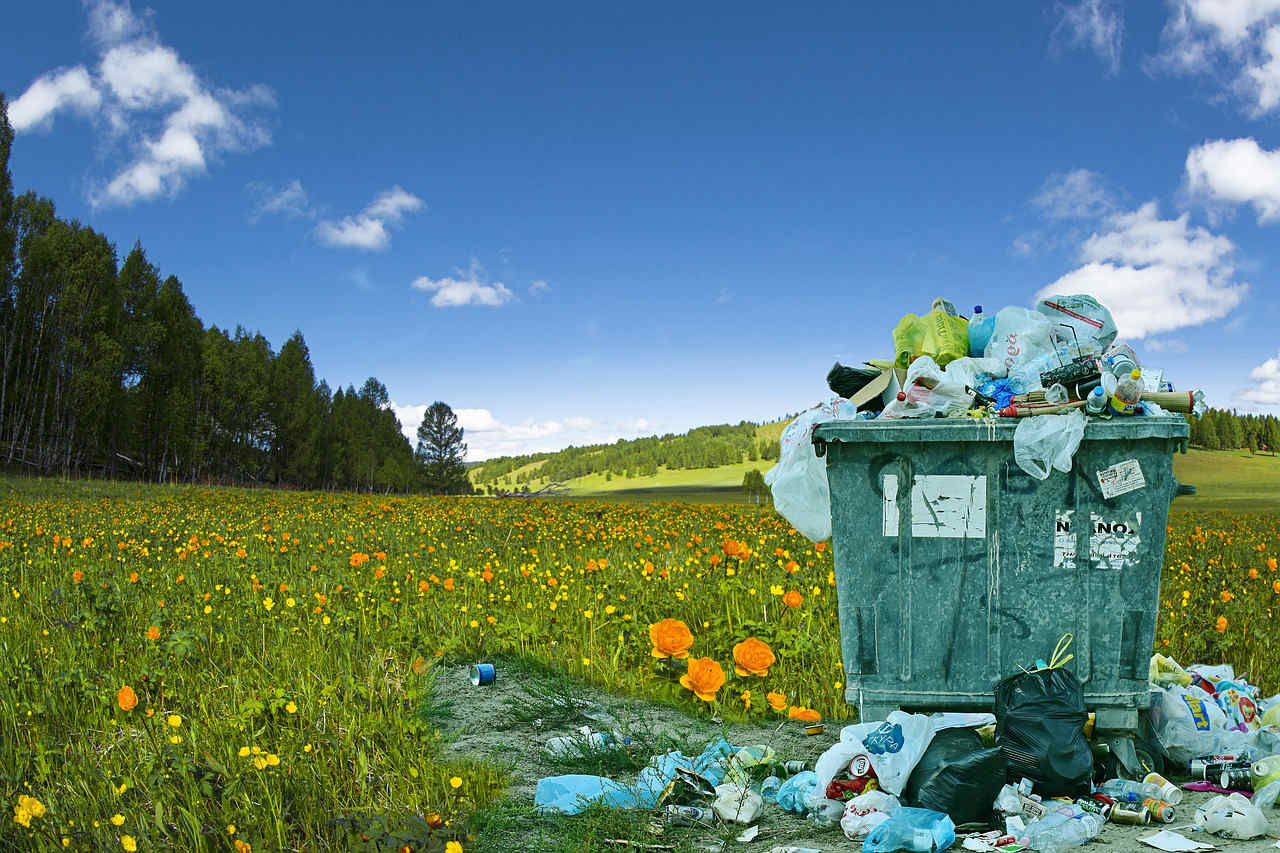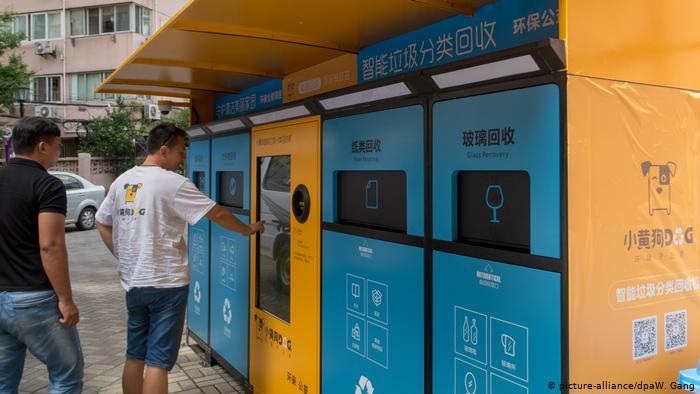


It was 7 am. With a perplexing wince on her face, Li Yue was standing in front of a garbage station in her neighborhood in Shanghai, sorting waste into the right container. A team of volunteers wearing yellow vests were stationed near the containers, keeping close eyes on every of her move.
“This is so much trouble!” said Li, who poured a cup of unfinished milk tea into one trash can and then the paper cup in another. In the past, she simply threw away the beverage with the packaging on, but now she could be fined up to 200 RMB (around $ 30) for doing so.
Li is not the only one who finds that the once common practice of discarding garbage has become an intricate and complicated mind test. Starting July 1, Shanghai introduced its compulsory household garbage sorting rules. Household waste is now required to be sorted into four categories: wet garbage (household food), dry garbage (residual waste), recyclable waste and hazardous waste. For urbanites, throwing garbage into the right bin has become a new way to start the hustle and bustle of city life. Rule-abiding dischargers will be rewarded with little gifts, whilst failing to do so may result in severe consequences, with some even facing heavy fines and their social credit rating being lowered.
“The launch of compulsory garbage sorting is a result that has been brewing for decades in Shanghai. Before, it was simply the conscientiousness of the people that lead them to sort garbage, but now the compulsory sorting has made it a responsibility for all,” Liu Xinyu, researcher of Ecology and Sustainable development at Shanghai Academy of Social Sciences, told Xinhua.
“Though troublesome, garbage sorting is necessary. Citizens like me are now trying our best to cope with this new reality, and we hope Shanghai can serve as a good example to the world,” Li said.
Vanguard in garbage sorting

China’s enthusiasm for recycling comes as the country upended global recycling habits in 2018 by banning many categories of foreign trash imports. In June, Chinese president Xi Jinping reiterated the importance of sorting garbage in a written instruction, calling upon China as the world’s second-largest waste producer to better sort and manage its waste.
As China’s most trash-generating city, sorting garbage seems to be an extremely urgent task for Shanghai. According to official statistics, the city disposes of more than 9 million tons of trash annually. Only 3,300 tonnes of recyclables are collected daily, compared to the 19,300 tonnes of residual waste and 5,000 tonnes of kitchen waste that are collected.
In the lead-up to promoting garbage sorting nationwide, bins that once took all types of garbage were abandoned in Shanghai. Instead, citizens are now required to visit designated trash collection stations to dispose different types of waste during designated periods of the day. Local authorities also hired thousands of instructors and conducted tens of thousands of training sessions to help people understand how to sort their rubbish.
According to official statistics from the Shanghai government, one week after the sorting rules were announced, 18,600 inspectors were dispatched to supervise the implementation of garbage sorting, 10,100 inspections had been carried out, and 7063 people had been warned on the issue.
The harsh rules have caused an online frenzy. On Sina Weibo, the hashtag #你是个什么垃圾, which can be translated into both “what’s your rubbish” and “what kind of rubbish are you”, has generated over 25 million views in just one week, with many struggling to sort the garbage correctly.
“According to the rules, though both fish bones and ribs are all kitchen rubbish, the former should go under the category of wet rubbish, while the later under other rubbish, since ribs don’t decompose easily. Dumping garbage is like an exam to me now, especially when the bins are guarded by volunteers who are eager to nitpick and fine you,” said a netizen.
In response to doubts from the public, People’s Daily issued a commentary on July 8, noting that the new rules must be strictly implemented, but at the same time, people’s needs and suggestions should also be taken into consideration.
“It’s understandable that there are oppositions against the sorting rules. But for the long run, the rule is necessary for China’s future development. While implementing the rules, authorities should listen to the people’s needs, making amendments based on reality,” read the commentary.
Though harsh, the sorting rules have been welcomed by the public nationwide, who believe that Shanghai’s tryout will help the nation to better recycle its enormous amount of waste. So far, 46 major cities have launched over 43,000 garbage-sorting themed lectures and activities, reaching out to more than 12,000,000 people with door-to-door education, and hiring over 700,000 volunteers.
According to the Chinese government, by the end of 2020, garbage sorting systems will have been built in 46 major Chinese cities, and all cities at the prefecture level and above should have built such systems by 2025.
Opportunities in garbage piles
Unlike residents who find garbage sorting time-consuming, gold diggers have found new business opportunities in garbage piles.
According to the rules, garbage collection time in Shanghai is generally between 7 am to 9 am, or between 6 pm to 8 pm, when most young people are either at work or enjoying their after-work life. Many of these young people are now looking for garbage-dumpers – people who can help them dispose their waste under the strict rules.
“My retired neighbors suggested that he can take care of my garbage, as long as I pay him 100 RMB monthly. Compared to the toil of sorting garbage and discarding them at designated time, this amount is worth it,” said Li.
Meanwhile, garbage-sorting products, such as assorted garbage containers, are becoming more popular. According to Xinhua, the sale of assorted bins on Taobao.com, China’s largest e-commerce platform, increased 500 percent in June, a month before the sorting rule was introduced. Among the buyers, over 85 percent are from Shanghai.
“Following the introduction of the garbage sorting rule nationwide, I believe garbage management can become a new industry that may provide more job opportunities,” Li said.

 Award-winning photos show poverty reduction achievements in NE China's Jilin province
Award-winning photos show poverty reduction achievements in NE China's Jilin province People dance to greet advent of New Year in Ameiqituo Town, Guizhou
People dance to greet advent of New Year in Ameiqituo Town, Guizhou Fire brigade in Shanghai holds group wedding
Fire brigade in Shanghai holds group wedding Tourists enjoy ice sculptures in Datan Town, north China
Tourists enjoy ice sculptures in Datan Town, north China Sunset scenery of Dayan Pagoda in Xi'an
Sunset scenery of Dayan Pagoda in Xi'an Tourists have fun at scenic spot in Nanlong Town, NW China
Tourists have fun at scenic spot in Nanlong Town, NW China Harbin attracts tourists by making best use of ice in winter
Harbin attracts tourists by making best use of ice in winter In pics: FIS Alpine Ski Women's World Cup Slalom
In pics: FIS Alpine Ski Women's World Cup Slalom Black-necked cranes rest at reservoir in Lhunzhub County, Lhasa
Black-necked cranes rest at reservoir in Lhunzhub County, Lhasa China's FAST telescope will be available to foreign scientists in April
China's FAST telescope will be available to foreign scientists in April